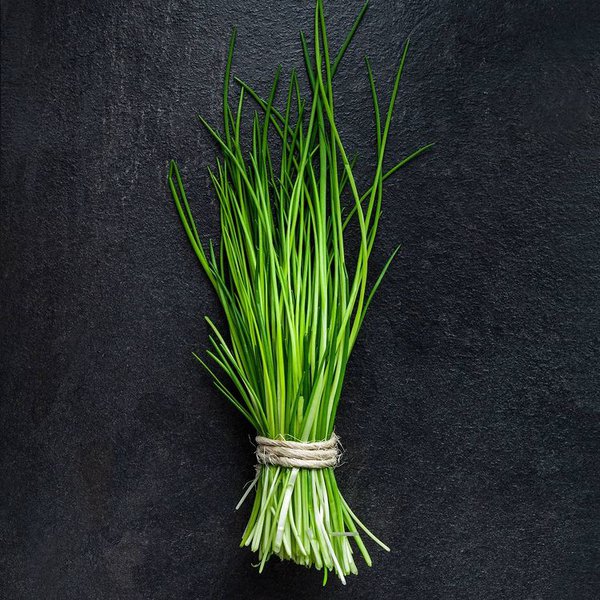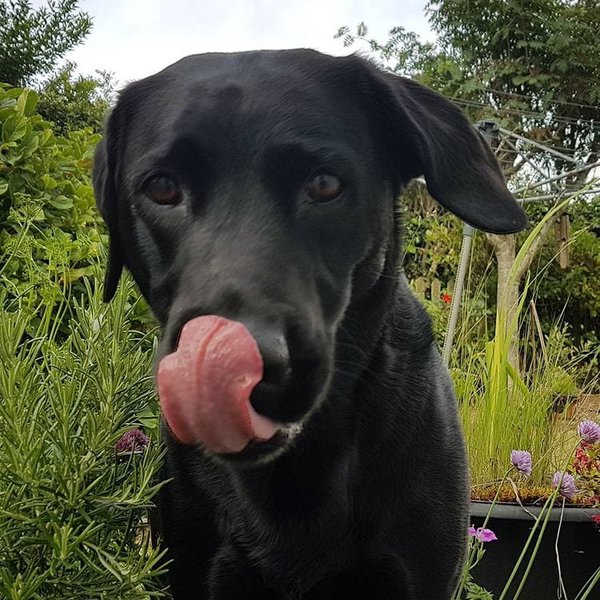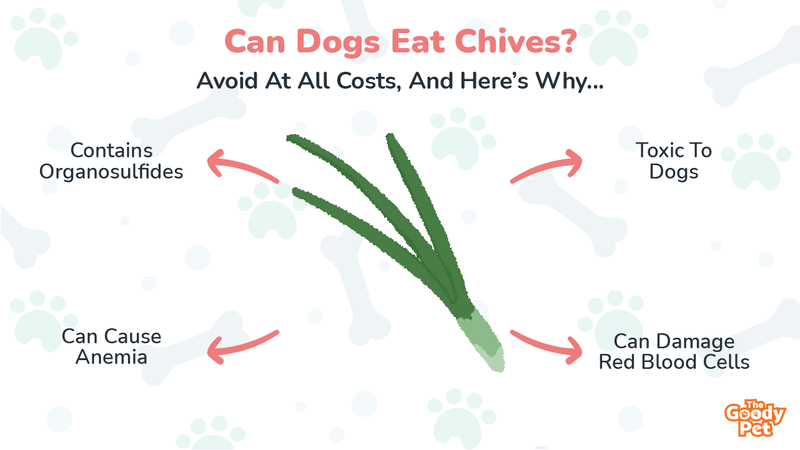Are you thinking of giving your dog chives, or has he eaten some, and now you are wondering if it is okay to feed chives to dogs?
No, dogs cannot eat chives due to their toxicity. If your dog eats a minute amount, then it won’t be harmed in most cases. However, if a large amount is consumed, then chives can intoxicate your pup.
If your dog has eaten chives by accident, hang in there to discuss this matter in detail. We will elaborate on some common symptoms, diagnoses, and treatments to help you attend to your pup.
What Causes Chives Poisoning In Dogs?

Chives poisoning is caused due to the organosulfides present in them, which are organic poisons that keep the plant safe from pests and insects. So, once chives are ingested, your dog gets poisoned.
Interestingly, chives are similar to onions due to their leaves and bulbs. We can eat both onions and chives without getting intoxicated, but it’s not the same case with dogs. Dogs can experience various amounts of toxicity due to consuming chives, some of which are as follows.
- Oxidative hemolysis
- Decreased blood oxygen levels
- Anemia
- Methemoglobinemia
- Oxidative damage to the erythrocyte cell membranes
- Increased risk of frailty in erythrocytes due to Heinz bodies
More About Chives
Chives are part of the Allium species, along with onions, leeks, and garlic. All of the species in this family are poisonous to dogs varying in degrees. They contain natural deterrents called organosulfides, which turn into sulfur compounds after plants get damaged, mainly due to chewing and tearing.
Plus, chives are toxic regardless of being cooked or uncooked because they get broken into highly reactive oxidants once they pass through the gastrointestinal tract. These oxidants damage the red blood cells and cause your dog to become anemic.
How Much Chives Is Toxic To Dogs?
It is crucial to know how many chives a dog can eat without getting poisoned to be sure when to take him to the vet. If your dog only chews on some leaves, then he will probably not get poisoned. However, if he eats around 300 to 600 chives, it can result in severe chives poisoning, causing anemia.
So, your dog has to eat a considerable amount of chive leaves to get adversely affected. While in case your pup eats chive bulbs, then you must hurry to the vet as it is the part that contains the actual toxins.
What Will Happen If My Dog Eats Chives?

After one day of eating chives, your dog will start vomiting, have diarrhea, or lose appetite. Consequently, your dog can get anemia which will become evident in around five days.
Common Symptoms To Look Out For
Chives poisoning can cause severe damage if left untreated. So, you must keep an eye on your pup, and to help you out in doing so, here is how to know if your dog has chives poisoning.
- Nausea
- Abdominal pain
- Oral irritation
- Vomiting
- Excessive drooling
- Diarrhea
In severe cases, it can also damage the red blood cells, which leads to anemia. You can know if your pup has anemia if he shows the following signs.
- Pale gums
- Lethargy
- Rapid heart rate
- Weakness
- Shortness of breath
Chives also tend to dilate blood vessels which leads to low blood pressure and circulatory issues. Moreover, the chemicals from these plants can limit the ability of blood to clot.
When To Take Your Dog To The Vet?
It is believed if your dog nibbles on a few leaves of chives, then it isn’t really necessary to take him to the vet. However, we recommend consulting a vet no matter what the case is. While you may be unsure, a professional always knows whether any treatment is required or not.
In addition, when your pup eats something harmful, the symptoms start becoming obvious a few days later. So, it is better to take him to the vet even if you notice the slightest sign because it only gets worse day by day. Plus, you can expect a quick recovery only with instant veterinary treatment.
The Process Of Diagnosis
Once you contact your vet and ask to bring your pup in, the first thing he will do is ask questions. As there is no particular test for chives poisoning, the vet will have to rely on the information you will provide.
These questions will be related to the food consumed plus its quantity, the signs you noticed, and the timespan of the prevailing symptoms.
Afterward, the vet will perform a clinical examination to specifically note any visible symptoms indicating that your dog is anemic. If prognostic uncertainty still remains, then he will proceed with blood tests to get an accurate diagnosis. It is possible that the vet will check your pup’s blood biochemistry to check its organs’ functionality and hematology.
Hematology is done to observe red and white blood cells, which provides solid evidence of anemia. Anemia caused by chives poisoning is identified to be Heinz body hemolytic anemia, because of the peculiar Heinz bodies formed within the red blood cells.
So, upon the confirmation of the presence of Heinz bodies, your pup will be ready to get treated or discharged depending upon the results.
How To Treat Chives Poisoning In Dogs?
There is no effective antidote available for chives poisoning in dogs. But, you can manage the toxicity by providing complete attention and care by following other methods such as decontamination.
Following are the treatments that are known to be effective in handling toxicity.
Oral Decontamination
Oral decontamination removes the toxic agent from the gastrointestinal tract to prevent it from getting absorbed further into the dog’s system. This process can be done in the following ways.
Oral Rinsing
For this, you’ll have to rinse your dog’s mouth with lukewarm water for 5 to 10 minutes to decrease or get rid of the ingested toxins. You can use a hose or a shower nozzle for flushing your puppy’s mouth. However, make sure to properly position the water source at the corners of the lips directed slightly upwards.
Inducing Emesis
It is the process of eliminating toxicants from the stomach by making the dog vomit. You can also feed your dog activated charcoal to decrease toxins absorption from the gut.
This procedure is considered to be effective if performed right after 40 to 90 minutes of ingestion. Don’t allow your pup to eat or drink for 30 minutes until after the vomiting. On the other hand, if it’s an adult dog, avoid feeding him for 2 hours.
Before performing any oral decontamination, the vet must check If decontamination is necessary or not. Plus, every case of poisoning varies according to the species, breed, weight, age, health record, the amount ingested, and exposure duration.
IV Fluids
Chives poisoning and the treatment involving emesis can cause dehydration in dogs. So, it is crucial to give your dog IV fluids to prevent or control dehydration and hypotension and to maintain blood oxygen levels.
After this, you must monitor your dog constantly for 2 to 3 weeks to check if the symptoms prevail or not. If your dog is anemic, both oxygen and blood transfusion will be needed together with IV fluids.
Recovery
If you are wondering how much time recovery from chives poisoning will take, then it depends upon the number of chives your dog ingested. Also, if your dog is suffering from other conditions, it’ll affect the recovery chances.
You will have to provide supportive care at home after getting your dog treated by the vet. For this, he will give you detailed directions, and there will be some follow-up visits to check if the canine is recovering properly. If you take adequate care of your pup and follow the guidelines religiously, your dog will definitely be healthy in no time.





